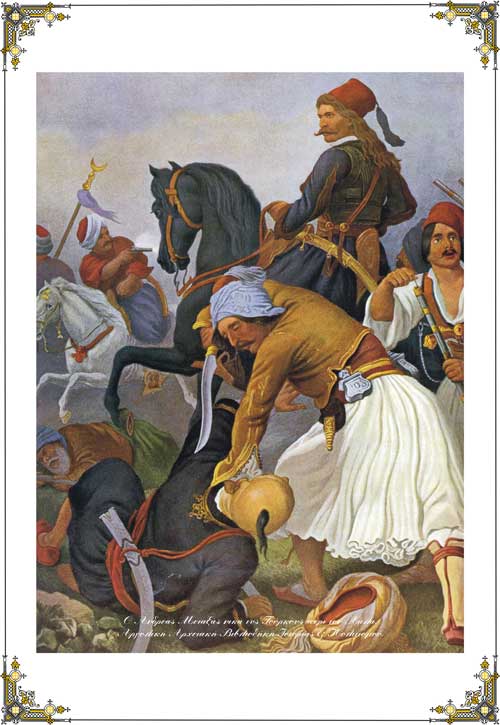
Battle of Lala (1821)

The Battle of Lala (9–13 June 1821) was one of the first major conflicts of the Greek War of Independence. It was a significant victory for the Greeks against the relieving Ottoman Turkish and the Muslim Albanian forces living in Lalas, Elis which constituted a serious impediment to the liberation struggle in the Peloponnese.
Muslim-Albanians had settled in Lalas, east of Pyrgos for several generations. For many years they raided the nearby farms, burnt houses and livestock of Greek and Turkish landowners on the plains of Gastouni and Pyrgos and even further afield. Consequently, Muslim Albanians of Lalas had become the quasi-sovereigns of Elis.
With the outbreak of the Greek War of Independence in late March 1821, some Greek military leaders recognised the Muslim-Albanian menace around Lalas and the possibility of coming to the aid of the coreligionists, the Ottoman Turks. As a result, the local Greeks initially attempted to siege the Muslim Albanians of Lalas but were not successful. Shortlybafter on May 13, a small force of Greek soldiers occupied a mountainous position near Lalas. Their position was vulnerable and likely to fall until the appearance of 500 volunteers of Ionian Islanders from Cephallonia and Zakynthos and their four cannons. The Zakynthian volunteers were led by Dionysios Sembrikos.[55]
On May 30 the Ionian Island force had grown with the arrival of fighters from Elis and Kalavryta. The combined Greek force endeavoured to surround Lalas. The Muslim Albanians of Lalas realised their difficult position and were shocked by the number and organisation of the Ionian Island volunteers. Some of the Ionian Island volunteers are likely to have received training in Western military tactics and organisation. The other Greek rebels were also impressed with the organisation of the Ionian Island force. Despite some disagreement between the Ionian Islanders and the Peloponnesians on the timing of their attack on the trapped Muslim-Albanians, the Ionian Islanders sent a letter to the Muslim-Albanians allowing them to surrender peacefully or be attacked and given over to the Peloponnesians. The letters was signed by Dionysios Sembrikos and the Zakynthian Panagtios Strouzas. However, this attempt at resolving the stalemate was indecisive.
The combined Greek forces decided to attack but were disorganised and it was repelled. The Muslim-Albanians requested assistance from Yousef Pasha in Patra who responded with around 1000–1500 men including 300 horsemen. When Yousef Pasha’s force approached the Muslim-Albanians in Lalas, they attacked the Greek forces, trapping them and allowing Yousef Pasha’s fighters to enter Lalas. The Peloponnesians wanted to withdraw at a safe distance but the Ionian Islanders were opposed to this. Yousef Pasha could not wait was he was afraid his main force would be attacked in Patras. Therefore, he took the initiative and attacked first with the aim of breaking the Greek camp, taking their cannons and fleeing to Patras. He met stiff resistance from the Ionian Island force with the Muslims-Albanians sustaining a significant number of casualties. The Zakynthian leader, Dionysios Sembrikos was also injured in battle along with several other Zakynthians.
On 14 June, the Turkish and Muslims Albanians retreated and fled to Patras without capturing any Greek cannon. The combined Greek forces entered Lalas. Ultimately, the Muslim Albanians left Greece and sailed for Anatolia.
The Greek victory was significant as the Muslim-Albanians of Lalas were considered very good fighters. Their displacement from Lalas meant the surrounding area of Elis and the broader north-eastern and central Peloponnese was less vulnerable to attack. The victory also strengthened the resolve of the Greek forces. For their participation in the battle, the Ionian Islanders including the Zakynthian volunteers were prosecuted by the British rulers upon their return to the Ionian Islands with arrests, imprisonment and confiscation of property.